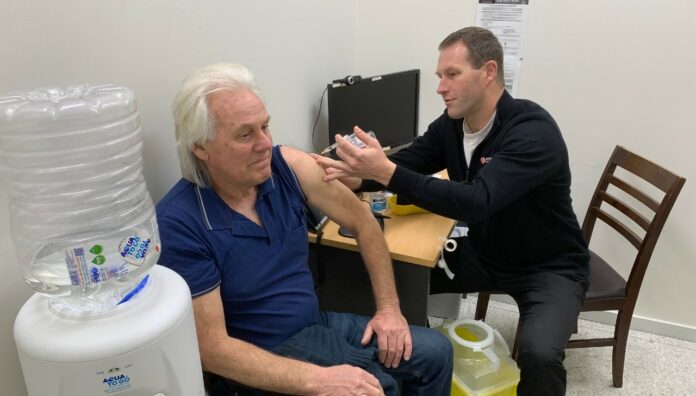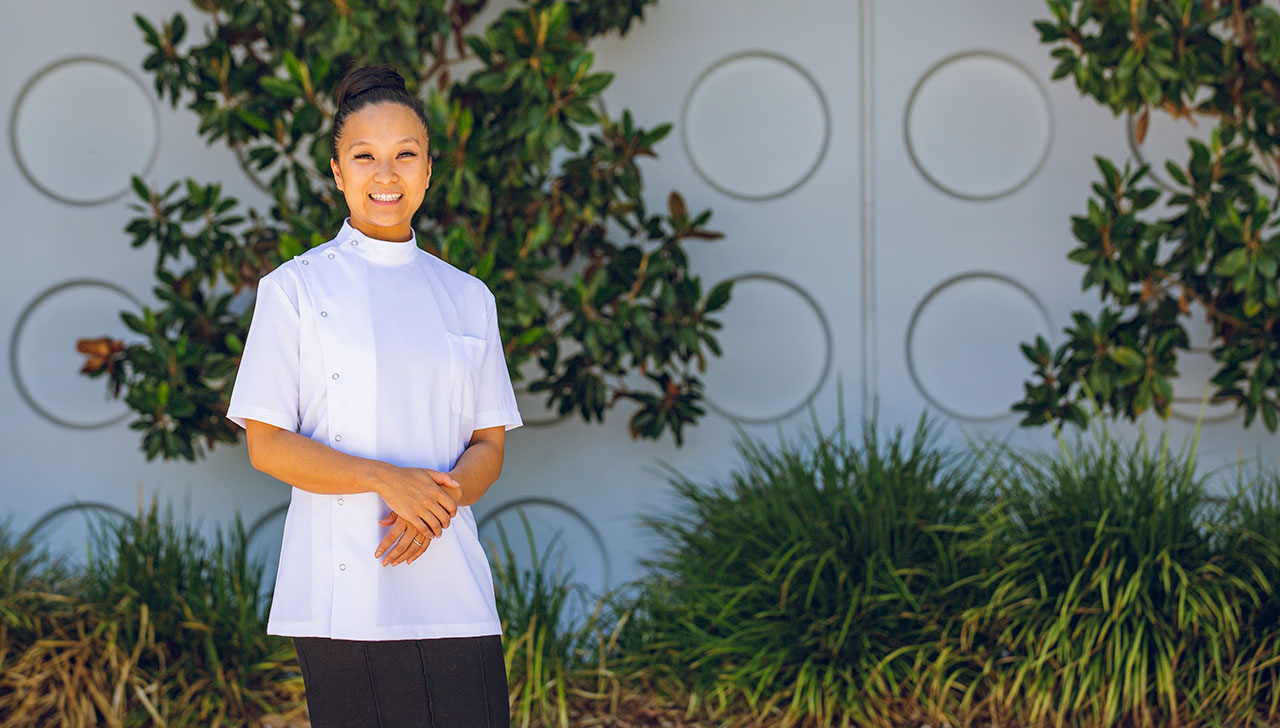
Tasmanian pharmacists new to the rollout discuss encouraging vaccination despite low case numbers, while a newly locked-down pharmacist in Canberra shares how she adapted quickly to restrictions.
More than 10 million Australians (49.5% of people over 16 years) have received at least one dose of the COVID-19 vaccine, with a record number (273,869) administered yesterday.
Within a few short weeks of joining the vaccination rollout, Australian Immunisation Register data revealed pharmacists have administered over 125,000 doses of the AstraZeneca vaccine.
With a huge jump in the number of pharmacies now offering the vaccine nationwide, from 676 last week to 2,479, Tasmania is the last state to bring pharmacists on board.
COVID-19 cases at a glance
|
Pharmacists join rollout
Last week, Tasmanian Premier Peter Gutwein announced the state would undergo a 6-week vaccination blitz as part of a ‘Delta Shield’ operation to keep the virus at bay.
With 28% of the eligible population fully vaccinated, and at least 50% having received their first dose, the government is hoping to reach 60% coverage through the ‘super six’ program.
Key to the vaccination strategy are community pharmacists, with 11 joining the rollout on Monday.
Among them is PSA Tasmania Branch Committee Vice President and pharmacy owner David Peachey MPS, who described pharmacy’s inclusion in the rollout as a ‘momentous occasion’.
‘It’s a great thing, and about time,’ Mr Peachey told Australian Pharmacist. ‘But [it’s] frustrating that it has taken so long.’
Because Tasmanian pharmacists can only vaccinate patients over the age of 60 with the AstraZeneca vaccine, Mr Peachey said uptake so far isn’t high, with many in this age cohort already vaccinated.
He has, however, fielded requests from younger patients keen to get vaccinated and confused about differing interstate advice.
‘We’ll say, “If you really want [the AstraZeneca vaccine], you can wait and watch this space”,’ Mr Peachey said. ‘Maybe the Tasmanian Government [will] change the legislation.’
Patients aged 30 and over are informed they are eligible to receive their Pfizer vaccine at state-run clinics, where Mr Peachey directs them for bookings.
Waiting game

Burnie-based pharmacist Brian Hanafin MPS was one of 26 strategically-located pharmacists originally designated by the state government to administer the COVID-19 vaccine.
Instead, he is waiting to receive his vaccine stock following a mix-up after the federal government expanded the rollout to include pharmacists.
‘All 26 of the originals got dropped out of the system,’ Mr Hanafin said. ‘But because it was [already] advertised that we’d have it, and it was on the state website, there’s been a lot of phone calls [from] people wanting to book [but] can’t.’
While Mr Hanafin is on board with the state’s vaccination blitz, he thinks pharmacists could be better utilised in the effort.
‘It is extremely difficult for people to get into any of the COVID-19 clinics, or even GP clinics to be vaccinated,’ he said.
‘And we [have more than] 100 pharmacies around the state, equipped, trained and ready to go.’
Vaccination, the tool available
With case numbers remaining low in Tasmania over the past year (233 to date), both pharmacists described the community’s view on vaccination as mixed.
‘A lot of people are now saying, “Okay, more than 50% of people have [had] their first dose, so it’s safe for me”,’ Mr Peachey said.
After a close call a couple of weeks back, when a positive case from Sydney entered the state, Mr Peachey fielded a jump in queries about the vaccine from concerned patients.
‘Some people realise it’s only a matter of time before we see more cases in Tasmania,’ he said. ‘Unfortunately, it’s not a matter of if, [but] when.’
Among others, however, Mr Hanafin said there is still a ‘wait and see’ mindset.
‘There are quite a number who want to wait for Pfizer or Moderna to be available to older [age groups],’ he said.
While he acknowledges the lack of immediate urgency to patients, he explains clearly that the situation could change at any minute.
‘’I’ll say, [vaccination] is the only tool available,’ he said. ‘If we want to see some degree of normalcy in life, then we have to have to go with it.’
From zero to lockdown
The nation’s vaccine push can’t come soon enough, with more regions around the country entering lockdowns in the past week, including the Northern Territory, the Australian Capital Territory, and the entire state of NSW.
When Canberra-based pharmacist Mandy Wang MPS woke up on 12 August, life was normal. By 5:00 pm that afternoon, the ACT entered its first lockdown since the early days of the pandemic.
 Despite the shock, and some initial panic buying, Ms Wang, pharmacist in charge at a local Chemist Warehouse, said the community quickly adjusted to their new normal.
Despite the shock, and some initial panic buying, Ms Wang, pharmacist in charge at a local Chemist Warehouse, said the community quickly adjusted to their new normal.
‘It was really busy on Thursday, [with] people coming in for their scripts,’ she said. ‘But then afterwards it died down. Everyone’s just isolating.’
With COVID-19 restrictions a distant memory for Canberrans, Ms Wang thought it would help to remind them that as an essential service, the pharmacy would remain open.
A message was sent out to regular patients, coupled with social media posts, to inform the community that if they weren’t due for a prescription refill, they didn’t need to come in that day to get it.
‘I think that comforted a lot of people, particularly the ones who sent a message back thanking us for [being] open,’ she said.
Protocol overhaul
To protect the staff and community at large, the Chemist Warehouse team quickly adapted their operating procedures, drawing from pre-existing plans for when Canberra’s COVID-19-free bubble eventually burst.
All staff were equipped with personal protective equipment, including masks and shields. More rigorous cleaning schedules were implemented, with surfaces requiring a wipedown every hour, and cleaners updated with a deep-cleaning schedule.
With the hygiene factors covered, roster changes were next.
‘Instead of having everyone at the [pharmacy] at once, we now have rostered staff who don’t go in,’ Ms Wang said. ‘For example, this week I’m standby staff, [so if] another pharmacist tests positive, I will go in.’
The roster shuffling also ensures staff don’t work at multiple locations, preventing the chance of COVID-19 jumping from one pharmacy to another.
‘I have staff [who] do multiple jobs as well, so [I’ll] have a conversation with them about how we’d like them to choose one workplace, just for the next week or so.’
Pharmacy managers keep up to date on new exposure sites, and a daily form is sent to staff with instructions to update management about any changes to their situation.
‘We’ve had close contacts who either haven’t worked at the pharmacy after that contact date, or people who live with close contacts,’ Ms Wang said. ‘But no one has tested positive so far.’
Pharmacists take care
As pharmacists continue to serve the community in the face of growing case numbers, new lockdowns and the COVID-19 vaccine rollout, the Pharmacist Support Service (PSS) has urged them to ‘take time to support each other’.
With calls to PSS up 16% in the last 12 months, President John Coppock also reminded pharmacists to prioritise self care.
‘All those working in pharmacy need to have adequate rest breaks, eat and stay hydrated during working hours to ensure they can work efficiently and effectively,’ he said.
‘Pharmacy staff who are exhausted and hungry will not perform at their best and may even place the public at risk if a concentration lapse results in an error.’
Pharmacists under pressure should seek help rather than trying to tough it out alone, Mr Coppock said.
‘As pharmacists we are all in this together and it is important that we look after ourselves and look after each other,’ he said. ‘If you need support, PSS is available as close as your phone.’






 ‘We’re increasingly seeing incidents where alert fatigue has been identified as a contributing factor. It’s not that there wasn’t an alert in place, but that it was lost among the other alerts the clinician saw,’ Prof Baysari says.
‘We’re increasingly seeing incidents where alert fatigue has been identified as a contributing factor. It’s not that there wasn’t an alert in place, but that it was lost among the other alerts the clinician saw,’ Prof Baysari says.




